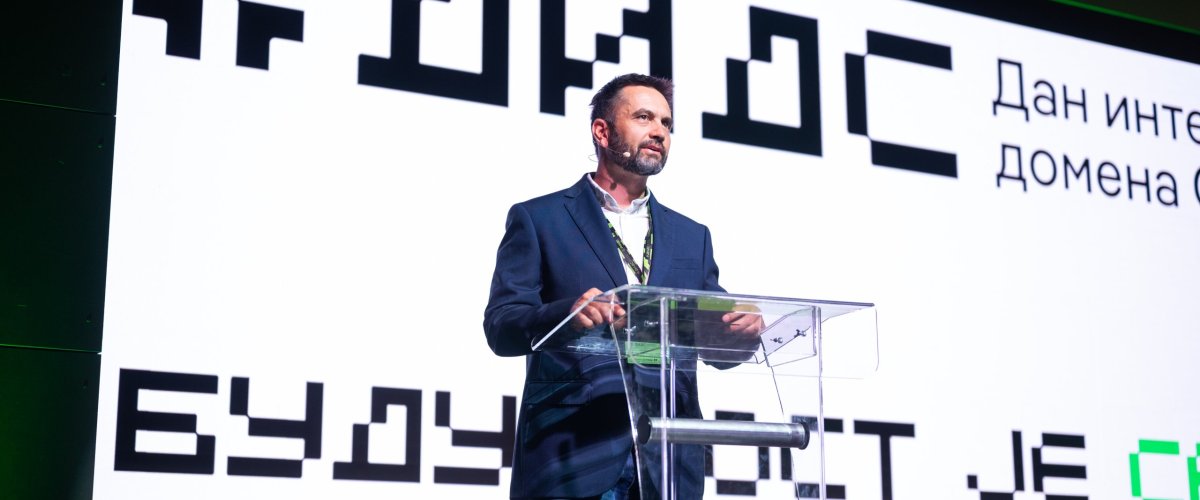The traditional Serbian Internet Domain Day (DIDS 2024) was held in Belgrade’s Youth Center
under the slogan “The Future is Now”.
The strongest impression among the visitors of the conference was that the slogan above
turned before their eyes into a series of concrete representations of the new reality that has
reached us and which fascinates us, but at the same time causes various questions, doubts,
and fears.
DIDS 2024 was opened by Milan Dobrijević, State Secretary in the Ministry of Information and
Telecommunications, and Dejan Đukić, Director of the Foundation Register of National Internet
Domains of Serbia (RNIDS) – the organizer of the conference, announcing the further
commitment of the government and tech industry leaders of Serbia to the development of
information technologies, with the special emphasis on the field of artificial intelligence (AI).
This year’s keynote speaker was Emily Roberts, an expert in the field of AI and machine
learning, who addressed the gathering on the topic of combating cyberbullying in the era of
deep fakes.
However, the audience was addressed by a person who does not exist!
Emily Roberts was an AI persona – a non-existent persona created by artificial intelligence just
for the needs of DIDS 2024.
Looking completely like a real woman who addresses the audience via video link with selected
words and appropriate accent, with “her” rich scientific biography and references, “Dr. Roberts”
“personally” demonstrated how much the so-called deepfakes can deceive the recipients of
information who are convinced that they are being addressed by a credible “blood and flesh”
person.
This surprising presentation of the AI persona created by the organizers was largely followed by
the subsequent lecture by psychologist Ina Poljak, who referred to the huge and numerous risks
of social engineering and the misuse of psychology as a science in the circumstances of high
technologies that are capable of deceiving and leading one’s thinking astray—even a relatively
cautious and digitally literate person.
The panel dedicated to the applications of existing AI tools and platforms was useful “from cover
to cover” because people who are successful in their very different creative industries shared
their experiences.
Under the moderation of Slobodan Marković, Digital Advisor at UNDP and Marijana Borković,
Communications Manager at RNDS, the interlocutors – Dane Blačić, Danijel Milošević, Đorđe
Krivokapić and Miloš Skokić shared their experiences, two of which stand out:
AI does not take jobs away from people in the creative industries, but it significantly helps them
improve productivity and performance, AI is changing established business processes, accelerating and automating them, but with the caution that further directions of rapid AI development cannot be predicted.
The allegorical performance (rather than a classical lecture) of Voja Žanetić made everyone
present think carefully about the future of human society in new circumstances. Although not mentioning it so directly, according to Žanetić, AI is an agent of the deconstruction
of today’s society. Whether this deconstruction will end with the entry into a utopian or dystopian society is a big question that (doesn’t) depend on us (perhaps artificial intelligence will also be
asked about it).
Translating abstract topics into concrete and useful information is a tradition of every DIDS.
Thus, a part of the conference was reserved for the presentation of the results of research on
the prevention of online security risks for small and medium-sized companies, as well as for two
success stories: the domen.rs portal and the “Local Guy on the Internet” project. Although they have different concrete goals, both of these projects aim to support the
development of the local community.
The audience was shown a film about the successful stories of small companies and domestic
entrepreneurs that were told on the domen.rs portal between two DIDS events, while “Local Guy
on the Internet” was designed so that the proceeds from the sale of locally branded clothing
support our gifted students, i.e. their going to international competitions in various scientific
fields.
As every year, DIDS deals with the presence and spread of the Cyrillic alphabet on the
domestic Internet. The Vice President of the Board of RNIDS, Dušan Stojičević, held a lecture
“Cyrillic on the Internet – Pros and Cons”, and prof. Dr. Slavica Cicvarić Kostić moderated the
panel on the relationship between the Cyrillic alphabet and branding.
In just one day during which it was held, the Internet Domain Day of Serbia 2024 once again
raised its own quality scale, leaving us to decide for ourselves whether AI is something good,
something bad, or something in between, which we will certainly deal with intensively in the near
future.
